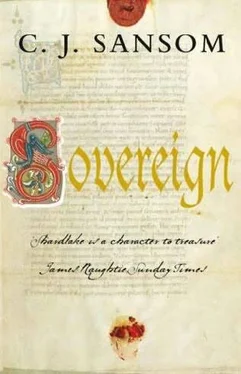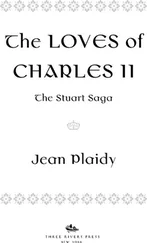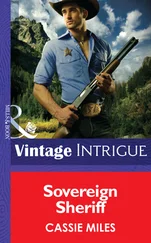We stood in silence, all that great concourse, watching the road ahead. At first nothing could be heard but the gentle tick-tick as leaves fell from the trees beside the road. The horses had been led some way into the field, near a long, low wooden structure draped with brown cloth. I wondered what it was for. A group of servants were manhandling long wooden planks behind the cloth. The planks had round, head-sized holes cut in them at long intervals, putting me in mind of an enormous row of stocks. I looked at Giles, who shrugged. I shifted the heavy petitions in my arms.
It was hot now and I caught the stink of sweat as men began perspiring in their robes. I touched my cap to make sure the wretched feather was still fixed properly, feeling sorry for the councillors standing bareheaded in the sun. Mayor Hall passed a hand over his bald crown.

WE HEARD THE PROGRESS before we saw it, a sound like distant thunder. The rumble grew louder and I realized it was the sound of thousands of hooves. Then I saw an enormous brown patch appear over a slight rise in the distance. It spread slowly up the road towards us like a giant stain, filling the wide road from side to side. It rolled on and on, no sign of an end. The rumbling and thunder of hooves filled the air, startling the birds from the trees, and I made out the shapes of hundreds of high-sided carts, pulled by teams of enormous draught horses. Red-coated soldiers rode alongside, knee to knee in two rows. And at the head a shimmering mix of bright colours that resolved itself into a crowd of gorgeously robed people on horses dressed almost as richly as their riders. I strained my eyes to see if I could make out the King, but just then a blast of trumpets sounded from the throng, making us all start, and the whole giant concourse stopped dead a quarter of a mile in front of us. The hoofbeats died away, to be replaced with a murmur of voices that rose and fell like the sea, with occasional shouted instructions audible to us as, under the soldiers’ eyes, we waited in expectant silence. I sensed the nerves of all around me were strained to breaking point. Even Giles seemed tense, his blue eyes alight with curiosity. He caught my eye and smiled. ‘Well,’ he whispered, ‘here it is.’
Lady Rochford, Rich and the other courtiers detached themselves from the Yorkers and rode over to the Progress, disappearing into the brightly arrayed throng at the front. There was silence for a few seconds more. Then things began to happen. The soldiers accompanying us rode ahead to form a line on each side of the road, between us and the Progress. Then figures began to detach themselves from the gorgeously robed crowd ahead and approach slowly on foot. First, half a dozen heralds, red tunics emblazoned with the leopards and lilies of the King’s arms, came to stand with the soldiers, holding aloft long trumpets from which bright pennants hung. Then two grooms wearing particoloured jackets in Tudor green and white led a pair of horses up, halting before us and a little to one side. Long coats, richly embroidered, hung over the animals’ backs almost to the ground, and the gold fringes and tassels on their black velvet harnesses glinted in the sun. One horse, a grey mare, was large enough but the other was gigantic, a huge charger. The King’s and Queen’s horses of state, I realized.
They kept coming, these harbingers of the King, in ones and twos, building the tension to breaking point. I felt my collar slick with sweat. The Chamberlain, an old man bearing a huge golden-handled sword of state, came and stood facing us, holding the sword up by the hilt. Nobles and ladies in scarlet and gold took places behind him. Among them I noticed a very big, barrel-chested man with a broad face framed by a brown spade-beard like Malev-erer’s. From his appearance I knew this must be Charles Brandon, Duke of Suffolk, the peer who had organized the Progress. He was on the Privy Council, he would know about Oldroyd, Blaybourne, my loss of those papers. And I thought, with a sudden tremor, does the King know too?
A group of small boys, the children of honour in yellow and green tunics and caps, now rode up and halted before us. A whole crowd of courtiers faced us now, their clothes swirls of gorgeous colour, caps and robes gleaming with jewels, their faces expressionless. It is a strange thing, but even the greatest tension can only be held for so long, and my mind drifted back to the ploughman I had seen earlier. I thought of how many hundreds of times my father must have walked behind the plough. If he could see me now, about to meet the King, would he be proud?
My attention was jerked back, not by a noise but by a new silence. The low rumble of murmurs and shufflings from the procession ahead fell away. Then the heralds raised their trumpets and blew long notes in unison. At once, behind us, there was a rustling sound as the York councillors fell to their knees. Recorder Tankerd stepped forward, then he too fell to his knees. Giles and I took off our caps and followed. The grass was damp under my knees.
Two figures then stepped forth. I had a quick glimpse of an enormous man, a small girl dressed all in silver by his side. I pulled off my cap and bowed my head deeply as the King and Queen approached, their footsteps audible in the sudden, total silence. I heard a faint creak and remembered it was said the King wore corsets now to hide his girth.
They stopped perhaps six feet away. On my knees, with my head bowed, I could see only the hem of the Queen’s dress, intricately sewn with tiny jewels of every colour, and the King’s white netherhose and square-toed white shoes, buckled with gold. His legs were thick as a bull’s. I saw he carried a jewelled walking stick that he pressed heavily into the cinders of the road as he approached. My heart pounded as I knelt there, gripping the petitions tightly, my cap held crushed against the papers.
‘Men of York, I will hear your submission!’ The voice that came from that enormous figure was oddly high-pitched, almost squeaky. Looking sidelong, I saw Recorder Tankerd, crouched on his knees, unroll a long parchment. He looked up at the King and took a long, shuddering breath. He opened his mouth but for a long, terrible second, no sound came. That moment’s silence was utterly terrifying. Then his wits returned and he began declaiming, a loud clear lawyer’s address.
‘Most mighty and victorious Prince -’
It was a long speech, the tone one of utter abasement.
‘We your humble subjects, who have grievously and traitorously offended Your Most Royal Majesty in the most odious offence of traitorous rebellion, promise and vow in the words of faith and truth to love and dread Your Majesty Royal to the utter effusion of our hearts’ blood…’
I dared not raise my head, though my neck was hurting again and my back too after so long kneeling, still holding the wretched petitions. I looked sideways at Giles. His big head was bowed almost to the ground; I could not see his expression. Tankerd concluded at last.
‘In token of our submission, Gracious Sovereign, we give you our address, sworn to by all here.’
He bowed low and handed the big parchment to one of the children of honour who came forward to take it.
Next the mayor stepped up, bearing the two ornate cups I had seen at the Guildhall. He knelt and with more words of abasement begged the King to accept the city’s gift. He was, I saw, sweating like a pig. He tumbled his words nervously and I could not catch all he said. My attention wandered again for a moment. Then a sudden fierce whisper in my ear from Giles. ‘Quick! It is us now!’ I felt my bowels lurch as I rose and turned to follow Giles, keeping my head bent. It was foolish, I that had once had Thomas Cromwell for a friend and confronted Richard Rich and the Duke of Norfolk, reduced to such a jelly. Yet this was not an official or nobleman I was approaching now. This was God’s anointed on earth, Head of His Church, guardian of the souls of three million subjects, more than human in his glory. In those few seconds I believed it all.
Читать дальше













